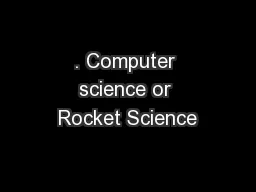PDF-(BOOS)-Concepts Ontologies and Knowledge Representation (SpringerBriefs in Computer Science)
Author : laloarata_book | Published Date : 2023-03-28
Recording knowledge in a common framework that would make it possible to seamlessly share global knowledge remains an important challenge for researchers This brief
Presentation Embed Code
Download Presentation
Download Presentation The PPT/PDF document "(BOOS)-Concepts Ontologies and Knowledge..." is the property of its rightful owner. Permission is granted to download and print the materials on this website for personal, non-commercial use only, and to display it on your personal computer provided you do not modify the materials and that you retain all copyright notices contained in the materials. By downloading content from our website, you accept the terms of this agreement.
(BOOS)-Concepts Ontologies and Knowledge Representation (SpringerBriefs in Computer Science): Transcript
Download Rules Of Document
"(BOOS)-Concepts Ontologies and Knowledge Representation (SpringerBriefs in Computer Science)"The content belongs to its owner. You may download and print it for personal use, without modification, and keep all copyright notices. By downloading, you agree to these terms.
Related Documents













![[DOWLOAD]-Ontologies with Python Programming OWL 2.0 Ontologies with Python and Owlready2](https://thumbs.docslides.com/970331/dowload-ontologies-with-python-programming-owl-2-0-ontologies-with-python-and-owlready2.jpg)
